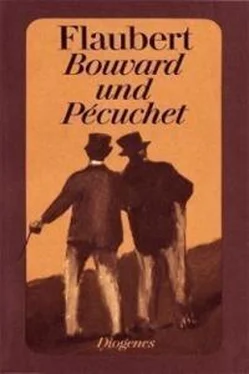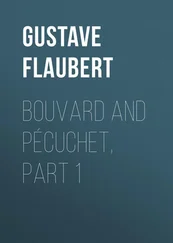"This is scarcely probable. Who knows, however? Let us make the attempt."
They cut themselves a forked branch from a hazel tree, and one morning set forth to discover the treasure.
"It must be given up," said Bouvard.
"Oh, no! bless your soul!"
After they had been three hours travelling, a thought made them draw up: "The road from Chavignolles to Bretteville!—was it the old or the new road? It must be the old!"
They went back, and rushed through the neighbourhood at random, the direction of the old road not being easy to discover.
Marcel went jumping from right to left, like a spaniel running at field–sports. Bouvard was compelled to call him back every five minutes. Pécuchet advanced step by step, holding the rod by the two branches, with the point upwards. Often it seemed to him that a force and, as it were, a cramp–iron drew it towards the ground; and Marcel very rapidly made a notch in the neighbouring trees, in order to find the place later.
Pécuchet, however, slackened his pace. His mouth was open; the pupils of his eyes were contracted. Bouvard questioned him, caught hold of his shoulders, and shook him. He did not stir, and remained inert, exactly like La Barbée. Then he said he felt around his heart a kind of compression, a singular experience, arising from the rod, no doubt, and he no longer wished to touch it.
They returned next day to the place where the marks had been made on the trees. Marcel dug holes with a spade; nothing, however, came of it, and each time they felt exceedingly sheepish. Pécuchet sat down by the side of a ditch, and while he mused, with his head raised, striving to hear the voices of the spirits through his astral body, asking himself whether he even had one, he fixed his eyes on the peak of his cap; the ecstasy of the previous day once more took possession of him. It lasted a long time, and became dreadful.
Above some oats in a by–path appeared a felt hat: it was that of M. Vaucorbeil on his mare.
Bouvard and Marcel called out to him.
The crisis was drawing to an end when the physician arrived. In order to examine Pécuchet he lifted his cap, and perceiving a forehead covered with coppery marks:
"Ha! ha! Fructus belli! Those are love–spots, my fine fellow! Take care of yourself. The deuce! let us not trifle with love."
Pécuchet, ashamed, again put on his cap, a sort of head–piece that swelled over a peak shaped like a half–moon, the model of which he had taken from the Atlas of Amoros.
The doctor's words astounded him. He kept thinking of them with his eyes staring before him, and suddenly had another seizure.
Vaucorbeil watched him, then, with a fillip, knocked off his cap.
Pécuchet recovered his faculties.
"I suspected as much," said the physician; "the glazed peak hypnotises you like a mirror; and this phenomenon is not rare with persons who look at a shining substance too attentively."
He pointed out how the experiment might be made on hens, then mounted his nag, and slowly disappeared from their view.
Half a league further on they noticed, in a farmyard, a pyramidal object stretched out towards the horizon. It might have been compared to an enormous bunch of black grapes marked here and there with red dots. It was, in fact, a long pole, garnished, according to the Norman custom, with cross–bars, on which were perched turkeys bridling in the sunshine.
"Let us go in." And Pécuchet accosted the farmer, who yielded to their request.
They traced a line with whiting in the middle of the press, tied down the claws of a turkey–cock, then stretched him flat on his belly, with his beak placed on the line. The fowl shut his eyes, and soon presented the appearance of being dead. The same process was gone through with the others. Bouvard passed them quickly across to Pécuchet, who ranged them on the side on which they had become torpid.
The people about the farm–house exhibited uneasiness. The mistress screamed, and a little girl began to cry.
Bouvard loosened all the turkeys. They gradually revived; but one could not tell what might be the consequences.
At a rather tart remark of Pécuchet, the farmer grasped his pitchfork tightly.
"Clear out, in God's name, or I'll smash your head!"
They scampered off.
No matter! the problem was solved: ecstasy is dependent on material causes.
What, then, is matter? What is spirit? Whence comes the influence of the one on the other, and the reciprocal exchange of influence?
In order to inform themselves on the subject, they made researches in the works of Voltaire, Bossuet, Fénelon; and they renewed their subscription to a circulating library.
The ancient teachers were inaccessible owing to the length of their works, or the difficulty of the language; but Jouffroy and Damiron initiated them into modern philosophy, and they had authors who dealt with that of the last century.
Bouvard derived his arguments from Lamettrie, Locke, and Helvetius; Pécuchet from M. Cousin, Thomas Reid, and Gérando. The former adhered to experience; for the latter, the ideal was everything. The one belonged to the school of Aristotle, the other to that of Plato; and they proceeded to discuss the subject.
"The soul is immaterial," said Pécuchet.
"By no means," said his friend. "Lunacy, chloroform, a bleeding will overthrow it; and, inasmuch as it is not always thinking, it is not a substance which does nothing but think."
"Nevertheless," rejoined Pécuchet, "I have in myself something superior to my body, which sometimes confutes it."
"A being in a being— homo duplex ! Look here, now! Different tendencies disclose opposite motives. That's all!"
"But this something, this soul, remains identical amid all changes from without. Therefore, it is simple, indivisible, and thus spiritual."
"If the soul were simple," replied Bouvard, "the newly–born would recollect, would imagine, like the adult. Thought, on the contrary, follows the development of the brain. As to its being indivisible, neither the perfume of a rose nor the appetite of a wolf, any more than a volition or an affirmation, is cut in two."
"That makes no difference," said Pécuchet. "The soul is exempt from the qualities of matter."
"Do you admit weight?" returned Bouvard. "Now, if matter can fall, it can in the same way think. Having had a beginning, the soul must come to an end, and as it is dependent on certain organs, it must disappear with them."
"For my part, I maintain that it is immortal. God could not intend―"
"But if God does not exist?"
"What?" And Pécuchet gave utterance to the three Cartesian proofs: "' Primo : God is comprehended in the idea that we have of Him; secundo : Existence is possible to Him; tertio : How can I, a finite being, have an idea of the Infinite? And, since we have this idea, it comes to us from God; therefore, God exists.'"
He passed on to the testimony of conscience, the traditions of different races, and the need of a Creator.
"When I see a clock―"
"Yes! yes! That's a well–known argument. But where is the clockmaker's father?"
"However, a cause is necessary."
Bouvard was doubtful about causes. "From the fact that one phenomenon succeeds another phenomenon, the conclusion is drawn that it is caused by the first. Prove it."
"But the spectacle of the universe indicates an intention and a plan."
"Why? Evil is as perfectly organised as good. The worm that works its way into a sheep's head and causes it to die, is as valuable from an anatomical point of view as the sheep itself. Abnormalities surpass the normal functions. The human body could be better constructed. Three fourths of the globe are sterile. That celestial lamp–post, the moon, does not always show itself! Do you think the ocean was destined for ships, and the wood of trees for fuel for our houses?"
Читать дальше








![Гюстав Флобер - Закат Карфагена [Сборник]](/books/414440/gyustav-flober-zakat-karfagena-sbornik-thumb.webp)


